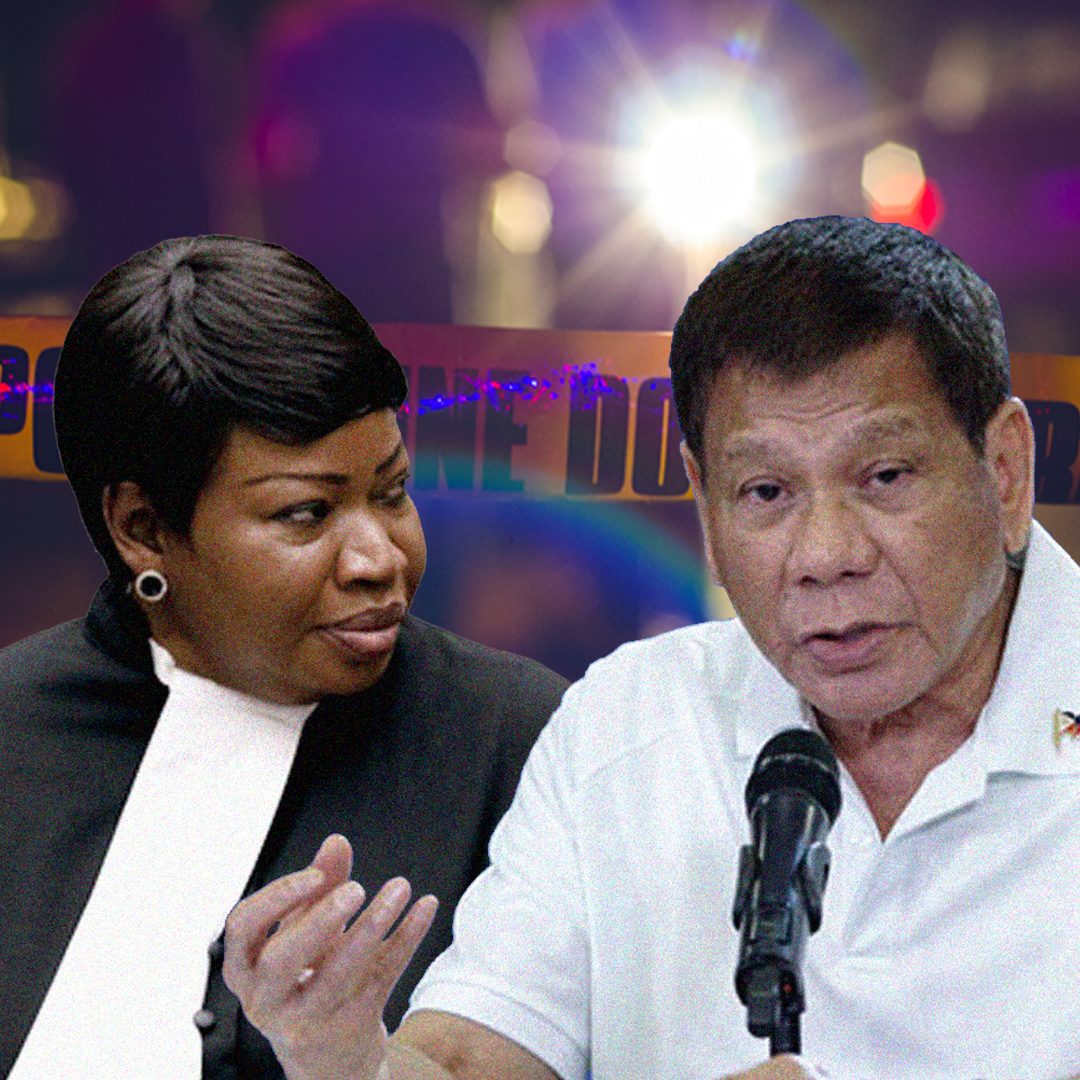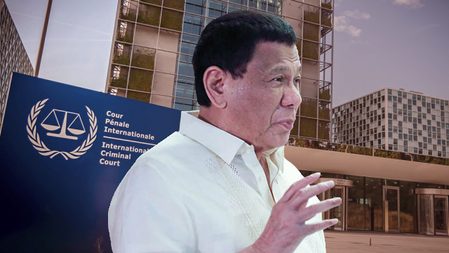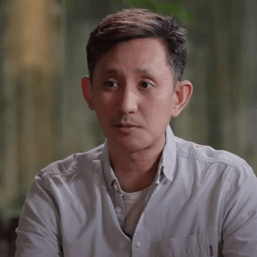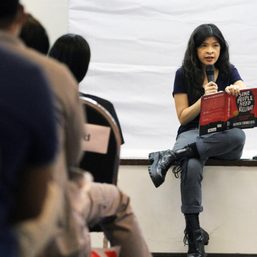SUMMARY
This is AI generated summarization, which may have errors. For context, always refer to the full article.

In her three-year preliminary examination into human rights abuses in the Philippines, outgoing International Criminal Court (ICC) Prosecutor Fatou Bensouda found that a mix of violent rhetoric, a “modus” of killings involving the same actors, and a pattern of cover-up all led to one conclusion: an apparent state policy of killings.
Bensouda on Monday, June 14, applied for an authorization with the International Criminal Court’s pre-trial chamber (PTC) to open an investigation into the alleged crimes against humanity committed in President Rodrigo Duterte’s bloody campaign against drugs. She also sought an ICC probe into the killings in Davao City from 2011 to 2016, before Duterte became president.
Bensouda retires on Tuesday, June 15.
She cited a pattern of killings during two periods under Duterte: his war on drugs as Philippine president from 2016 to 2019, and the alleged Davao Death Squad (DDS) killings from 2011 to 2016, when Duterte served as mayor and vice mayor of Davao City.
“These extrajudicial killings, perpetrated across the Philippines, appear to have been committed pursuant to an official State policy of the Philippine government,” Bensouda said in her 57-page request with the PTC.
There is an estimated total 27,000 people killed in the five-year ongoing war on drugs, with the police admitting that 7,884 were killed in legitimate anti-drug operations as of August 2020. Philippine cops said all those who died in their operations were armed and resisted arrest, leading to a shootout.
Claiming that the narrative of self-defense “is consistently undermined by other information,” Bensouda said there are “indications of planning and intentional killings.”
“A number of statements by local officials and insiders also indicate that killings were planned in advance, rather than arising spontaneously when suspects fought back,” said Bensouda.
“Police and other government officials planned, ordered, and sometimes directly perpetrated extrajudicial killings,” was Bensouda’s conclusion.
Cops behind vigilantes
The bulk of the drug-related killings was attributed to so-called vigilantes. This covered the period when people wound up dead in dark streets with a cardboard bearing a sign that they were drug addicts, not to be emulated.
“The perpetrators of such killings appear to include law enforcement officers who sought to conceal their true identity, private actors who coordinated with and were paid by the police, and in some cases other private individuals or groups instigated to act by the government’s War on Drugs campaign and statements by Duterte calling for drug suspects to be killed,” said Bensouda.
Bensouda cited open-sourced accounts of vigilantes “who claimed to have been ordered and paid by police to kill alleged drug offenders, and to plant evidence at the crime scenes.”
There is also a pattern of cover-up, said Bensouda.
“Sources suggest that police planted evidence at crimes scenes, produced false or misleading incident reports, and took other measures in an effort to conceal the manner in which the killings occurred and to support claims of self-defense,” said Bensouda.
Language kills
Bensouda noted that Duterte’s violent rhetoric forms part of a policy to kill.
“The plethora of public statements made by Duterte and other Philippine government officials encouraging, supporting and, in certain instances, urging the public to kill suspected drug users and dealers also indicate a State policy to attack civilians,” said Bensouda.
About the DDS, Bensouda said the same actors from Davao carried out the war on drugs in Manila, referring to policemen plucked from the South and transported to the most notorious stations in the capital.
“The persons alleged to have perpetrated the pre-2016 killings in Davao are groups of local police officers and vigilantes, notably the DDS (which included both police officers and private citizens). The available information suggests that local law enforcement were heavily involved in the DDS, and that some DDS members were in fact police,” said Bensouda.
Bensouda added: “Persons involved in pre-2016 killings in Davao in some cases appear to be the very same people that were later involved in the War on Drugs.”
All of these findings led Bensouda to conclude that there is basis to say that the crime against humanity of murder has been committed under Duterte, whether as president or as mayor.
“There is a clear pattern of violence directed at the targeted population, with a general modus operandi and an apparent pattern of seeking to conceal the unlawful nature of the killing, for example, by planting evidence and falsifying reports,” said Bensouda.
Presidential Spokesperson Harry Roque lashed out at Bensouda on Tuesday morning, saying that her request to investigate was “politically motivated.”
Insisting that the Philippine justice system is able and willing to investigate abuses, Roque said: “How dare you say that the Philippines’ legal system is not working? This is an emotional issue for all lawyers.”
Justice Secretary Menardo Guevarra chose not to comment on Bensouda’s report. “As far as the Department of Justice is concerned, such development has absolutely no effect on the ongoing work of the review panel on drug deaths, as well as on the Philippines-UN joint program on technical cooperation on human rights,” said Guevarra. – Rappler.com
Add a comment
How does this make you feel?






![[The Slingshot] Alden Delvo’s birthday](https://www.rappler.com/tachyon/2024/04/tl-alden-delvo-birthday.jpg?resize=257%2C257&crop=263px%2C0px%2C720px%2C720px)
![[EDITORIAL] Ang low-intensity warfare ni Marcos kung saan attack dog na ang First Lady](https://www.rappler.com/tachyon/2024/04/animated-liza-marcos-sara-duterte-feud-carousel.jpg?resize=257%2C257&crop=294px%2C0px%2C720px%2C720px)
![[Newsstand] Duterte vs Marcos: A rift impossible to bridge, a wound impossible to heal](https://www.rappler.com/tachyon/2024/04/duterte-marcos-rift-apr-20-2024.jpg?resize=257%2C257&crop=278px%2C0px%2C720px%2C720px)


![[Rappler’s Best] Patricia Evangelista](https://www.rappler.com/tachyon/2024/04/unnamed-9-1.jpg?resize=257%2C257&crop=486px%2C0px%2C1333px%2C1333px)


There are no comments yet. Add your comment to start the conversation.